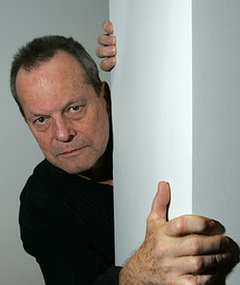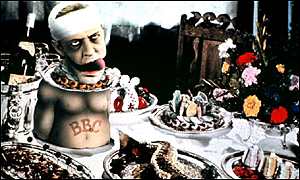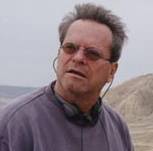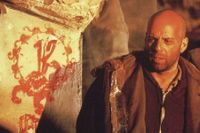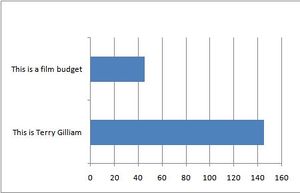Terry Gilliam
Terrence Vance "Terry" Gilliam (born 22 November 1940) is a deranged-as-all-get-out British-American director of movies. He has even finished some of them, though rarely without going so far over budget that everyone in the industry wonders how he has managed to keep doing it.
Spending someone else's millions on elaborate, wacky, surreal sets and demanding that every nuance of his brilliant final draft description be faithfully rendered in materials, Gilliam surprises everyone involved when he does manage to complete a project. If anyone ever suggests he save money by rendering some of his bizarre visions in CGI, he shoots them in the face.
Early life
Gilliam was born in a small town in Minnesota called Medicine Lake. His mother was split open in two, a hand lifted the top half at the head, another hand reached into the bottom half, there was a rude spitting sound, and Gilliam was pulled out to the tune of circus music.
There were many early signs of Gilliam's disturbing derangement: he got straight "A"s throughout his school years, he was the senior Prom King, he was voted "Most Likely to Succeed" by his classmates, and he joined a prestigious fraternity in college — all this for a man uglier than a rotting pumpkin. Something wasn't right.
Monty Python
When Gilliam started, he was quite benign. The industry was safe from him, as he was stuck in a hovel, grimacing maniacally, making rather uncomfortable cutout animations as the lone American member of England's premier comedy team of piston engine salesmen, Monty Python.
Psychoanalysis of the rather uncomfortable cutout animations have revealed a dangerous derangement that should have precluded a film career for Gilliam,[citation needed] and rather indicated a comfortable living in a special home where he could be under constant supervision, for the safety and comfort of everyone else. But this psychoanalysis has come too late. The Pythons, being fond of the rather uncomfortable, had already decided to entrust Gilliam with the direction of their first feature film.
Filmmaking career
The Pythons, however, cautious of Gilliam's derangement, did not trust their first film to him alone. They assigned Terry Jones, the team's premier cross-dresser, to chaperone him in the direction of their comic masterpiece, Monty Python and the Holy Grail. This movie, of course, needs no write-up here. I only have to write "Ni!" to cause fits of tear-deluged laughter, such is the ubiquitous popularity of this work. Watch, I'll try another: "She turned me into a newt.... I got better." And, "He's oppressing me! Did you see him oppressing me?" "I am a shrubber." "It's just a flesh wound." I could go on.
With the success of this venture, Gilliam got it into his head that he could do this for a living. By himself. Without a net, if you will. The result of this deranged fantasy, Jabberwocky, has never been seen, not even by the most ardent Python fan. Word is that it is more deranged than Gilliam could possibly have intended, but could not possibly have avoided.
The utter lack of success of this venture gave Gilliam the confidence he needed to ruin as many film projects as he possibly could, and he set out on his notorious filmwrecking career.
Time Bandits
It all started out relatively harmlessly. Time Bandits (1981), his first feature film unaffiliated with the Pythons, did go disturbingly over budget. But the industry did not yet appreciate how bad it could get. Looking back, perhaps it should have been a red flag when the script, written by fellow Python Michael Palin, called for a character to be played by a Sean Connery-type actor, someone "of equal, only cheaper, stature" and Gilliam went out and hired Connery himself. They ignored these warning signs, and only sort of patted him on the back and said, "You'll get it right next time." It helped, of course, that the film was a box office and critical success. But with a quasi-religious fantasy/myth involving hilarious midgets who work for God and hate their job, so they find a time portal and use it to steal precious artifacts from history, he could not possibly go wrong.
Brazil
There are few that would argue with the statement that Brazil (1985) is among the greatest alternate-reality films ever made. It also represents the first and last time Gilliam ever capitulated his creative vision due to a financial and feasibility constraint. Dream sequences permeate the narrative, giving Gilliam ample opportunity to explore his deranged vision. But one of these — the famous "eyeball dream sequence" described so exquisitely in the screenplay — was actually scrapped after several hundred thousand dollars were spent trying to create it according to Gilliam's very demanding and exact requirements. 1985 was not exactly a great era in CGI technology, but the truth is Gilliam still refuses to use it to this day, so that is no excuse.
Be that as it may, as over-budget satirical dystopian visions of a soul-crushing consumer-centric future go, Brazil remains one of the best. Relative box office success and a Best Picture of the year award from the L.A. Film Critics failed to deter Gilliam from doing further damage to the film industry, and he moved on to his next project.
The Adventures of Baron Munchausen
There is disagreement today among film historians over whether Adventures... (1988) is a failure or a colossal failure. In either case, it is this film that once and for all established his reputation in the industry. At the cost of US$46 million, it raked in a near-zero US$8 million box office, and this after two film studios in Italy and Spain ran out of money, a film insurance company set Gilliam an ultimatum deadline and threatened a lawsuit, and the distributor all but bailed out.
The actors in the film were no friend of the director either. The little nine-year-old girl, Sarah Polley, complained about being in freezing cold water for hours on end and working twelve to fourteen hour days. Gilliam's response was "What?" Even his star and friend Eric Idle lamented the nightmare that was the making of this movie, saying "You definitely go see a Gilliam film — you just don't be in one."
Gilliam considers this film to be a shining triumph of his will over the evil forces of the industry. He often fantasises about battling them with a long sword and a magic suit of armor.
The Fisher King
For a brief shining moment in 1991, even Gilliam got sick and tired of Terry Gilliam and his relentless Terry-Gilliaminess. So he left Terry Gilliam behind, for the most part, and made The Fisher King. Gilliam was not involved in writing the screenplay, he capitulated when scenes weren't working, he was kind and generous to his performers, he came in well under budget, and no one got hurt or sued. Lest we suspect that this is not one of his films,[1] however, there is a Holy Grail and a dream Red Knight.
Twelve Monkeys
Twelve Monkeys (1995), one of the films contributing to the "Bruce Willis is only good with his head shaved" argument (see right), was also made within budget. But the script was also not Gilliam's and the only reason he was able to bring it in under budget was because he convinced Willis to take a massive cut to his asking price. Also, getting assigned to direct it allowed him to fail to complete the project he had been working on — a film adaptation of A Tale of Two Cities, one of many that he has abandoned mid-project.
And just when the industry thought it was safe to stay far away from Terry Gilliam, Twelve Monkeys turned out to be a huge box office and critical success. For its relatively tiny budget it made well over US$150 million. Once again, Gilliam had lifted himself onto the A-list and awaited his opportunity to strike.
Fear and Loathing in Las Vegas
As Gilliam's films had always been something of an acid trip themselves, it was only fitting that Gilliam would make the film adaptation of the memoirs of the acid trip king himself, Dr. Hunter S. Thompson. About fourteen directors before him attempted to convince the Gonzo master that they were the one to do it. But it wasn't until Thompson met Gilliam that he felt a soul-mate connection, someone deranged enough to see his vision to the screen.
With this one Gilliam was on his way back to form. While the budget was very low, it far outdid the box office revenues. Gilliam's fervent hope that everyone would hate the movie except Thompson himself was realized, to his great delight.
The Brothers Grimm
Gilliam's next film, The Brothers Grimm (2005), went through a notably troubled production process. The Weinstein Bros., Harvey and Bob, thought they could manage the cost of Gilliam's notorious over-protective grip on his creative vision[2] by forcing him to film in the Czech Republic. Gilliam snidely referred to this tactic as turning an 120-140 million dollar film into an 80 million dollar film, which deeply offended his sensibilities.
Throughout production Gilliam had nothing but disdain for the Weinsteins, and took every opportunity to express it. He was vindicated and relieved, however, when the film — released with Gilliam's final directorial word — was universally despised, and failed to recoup its cost.
Tideland
Even if you are extremely fond of gut-wrenchingly disturbing images and themes, such as a young pre-teen girl dealing sickeningly matter-of-factly not only with the death before her very eyes of both of her drug-addled and useless parents, but also the slow decay of her father's body in the ensuing days as the flies consume him in his easy chair, or said father enlisting said girl's aid in administering his heroin fix, or the same girl befriending a mentally challenged older man whose sexual intention towards her is presented more clearly than the film itself even cares to admit, or any number of other unmentionable images this film portrays without apology, Gilliam manages to eschew the visceral glee that the catharsis argument relies on and simply makes it unwatchable. Despite this, or perhaps because of it, Gilliam appears on the screen himself at the beginning of this film to implore you to watch it as a child would, as though you would ever allow your child to see such things, appreciating that because it's the girl's reality and she knows no other, she takes it in stride. By doing so, he marvellously claims, the film becomes a comedy. As he intends it. Deranged is the right word, I think.
By the way, over or under budget makes little difference here. Let's move on. Do you need a bag?
The Imaginarium of Dr. Parnassus
2009's Parnassus saw Gilliam returning to form, of course madly over budget. This time, however, it appears that Gilliam discovered a new and interesting way to do it. The film, which was coming in under budget, had to stop production when the lead actor left the project under terminal circumstances. That is to say, he died. Gilliam got himself into a tit over two things: one, how would he complete the project (which never bothered him before, but...) and two, how would he take this thing over budget?
In a brilliant move which he wondered why he hadn't thought of before, Gilliam decided to hire three big-name and high-priced actors to complete the task that Heath Ledger could not. It was like getting one star for the price of four! Just to ensure that he exceeded the budget, he hired the best of the best; Johnny Depp, Jude Law, and Colin Farrel.
Unfinished work
If you think that's extraordinary, Gilliam's various failures and unfinished projects list is even more impressive: Good Omens, A Tale of Two Cities, A Connecticut Yankee in King Arthur's Court, The Defective Detective... the list is massive.
One of his most famous failures is now considered "unfinished". As if to spite the good men who documented his failure to make The Man Who Killed Don Quixote in their acclaimed film Lost in La Mancha, Gilliam has vowed to finish it. Right. Over budget, though, you can be certain.
He is also said to be in the middle of pre-production on an animated Gorillaz movie. It is doubtful that the group is still making enough scratch to put a Gilliam project together, however.
In addition to unfinished work, there is a long list of projects he has been kicked off of for his intransigence. He was originally tagged to make The Watchmen as well as the first Harry Potter movie. The producers of these films, scared out of their pants by Gilliam's reputation, went soft and made bland adventure films out of the subjects which Gilliam has called "pedestrian". One can only imagine what Gilliam's deranged mind would have done with the likes of those works. Though one can be certain they would have gone way over budget.
See also
Notes
- ↑ as some suspect that Shakespeare did not write Titus Andronicas, for instance
- ↑ Which, after the filming of Brothers, Matt Damon referred to as "nuclear"
